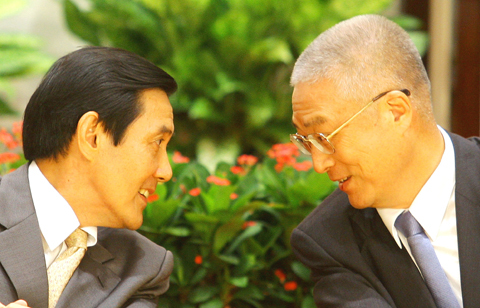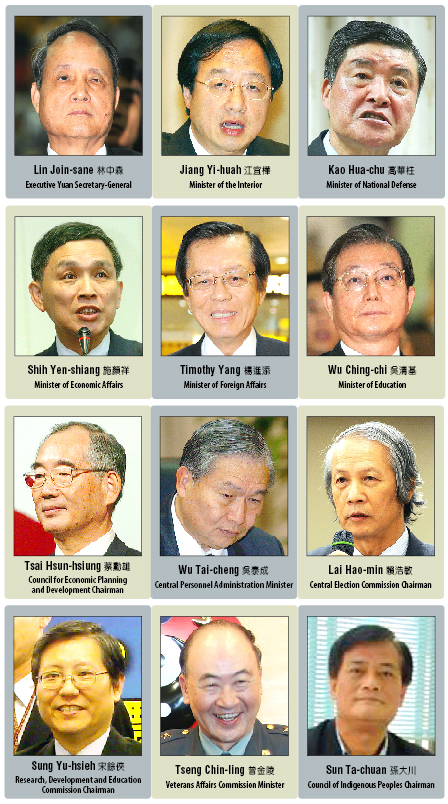Swearing in his new Cabinet yesterday, President Ma Ying-jeou (馬英九) denied that the Cabinet reshuffle was aimed at winning December’s local elections, saying that one of the new Cabinet’s main tasks would be to enhance disaster-prevention measures after Typhoon Morakot wreaked havoc in southern Taiwan last month, claiming at least 619 lives.
Leading incoming Premier Wu Den-yih (吳敦義), Vice Premier Eric Chu (朱立倫) and Presidential Office Secretary-General Liao Liou-yi (廖了以) in a meeting with the media at the Presidential Office yesterday afternoon, Ma said he was not so “short-sighted” as to reorganize the Cabinet for the purpose of winning the year-end elections.
“This new team is an ‘action Cabinet,’” Ma said. “It has the ability to execute policy, be competitive and exercise soft power.”

PHOTO: CNA
Ma said he had high expectations for the new Cabinet and he hoped it would take the public’s interests to heart.
Many challenges lay ahead, the president said, such as completing post-Morakot reconstruction work, improving disaster prevention, flood prevention and mountain management projects, reviving the economy and combating the A(H1N1) swine flu strain.
He added that incisive government action would be essential in reviving the economy.

The president said he regretted having to bid farewell to outgoing premier Liu Chao-shiuan (劉兆玄), who led the Cabinet in resigning yesterday morning to take political responsibility for the typhoon disaster.
Nevertheless, Ma said, he admired Liu’s courage and appreciated his efforts to lay a sound foundation for the economy, social security, cross-strait relations and international relations.
Ma said he had selected Wu as premier because they were “old friends” and Wu had extensive political experience. The president added that he was also impressed by Wu’s “cool-headedness” and professionalism.
Rejecting media speculation that Wu and Liu were on less than cordial terms, Ma said that when he was looking for a party secretary-general during his stint as Chinese Nationalist Party (KMT) chairman two years ago, Liu recommended Wu for the position.
Ma said Chu was a “likable guy” who had the ability to get things done, possessed great creativity and had a global perspective.
When asked about his administration’s plan to sign an economic cooperation framework agreement (ECFA) with Beijing, Ma said he hoped both sides would resume negotiations as soon as possible.
Wu said the new Cabinet would not rush ECFA talks and emphasized that it would adhere to Ma’s doctrine on cross-strait development, which Wu said was to take a “Taiwan-centered approach while furthering the public’s interests.”
“We will exert ourselves in accordance with this doctrine,” Wu said. “Any cross-strait agreement must be signed under the following conditions: the country needs it, the people support it and the legislature supervises it.”
Ma also rebuffed speculation that Vice President Vincent Siew (蕭萬長) had been kept in the dark about Liu’s resignation.
Ma said Liu told Siew about his intention to resign the day after he had informed the president in the middle of last month.
In response to complaints from reporters about a lack of transparency over the Cabinet reshuffle, Ma apologized for the secrecy, saying he had wanted to protect the morale of Cabinet officials preoccupied with relief efforts.
Earlier yesterday, Siew oversaw the hand-over ceremony at the Executive Yuan in Taipei.
Siew praised Liu for achievements on many fronts — establishing integrity in government, carrying out tax reform, “sailing through the global financial tsunami,” improving cross-strait relations, expanding Taiwan’s international space and taking care of disadvantaged people.
“That Liu resigned as premier to take responsibility for the flooding shows his statesmanlike qualities. What he has done during his term will be regarded highly by history,” Siew said.
Liu said that he would continue to contribute to post-disaster reconstruction work.
“Although I am released from my heavy burden as premier, I can’t forget about the reconstruction of typhoon-hit areas,” Liu said.
Asked about his plans after leaving office, Liu, who came under fire for getting a haircut on Aug. 11, at the height of the rescue efforts, said yesterday: “[I am going to] have a haircut.”
Later yesterday, Wu convened a Cabinet meeting where he called on members to “be slow to promise and sure to perform,” saying it was essential for the government to be reliable.
Also See: EDITORIAL: An election Cabinet in place
Also See: FEATURE: Liu had no choice but to resign, analysts say

The US government has signed defense cooperation agreements with Japan and the Philippines to boost the deterrence capabilities of countries in the first island chain, a report by the National Security Bureau (NSB) showed. The main countries on the first island chain include the two nations and Taiwan. The bureau is to present the report at a meeting of the legislature’s Foreign Affairs and National Defense Committee tomorrow. The US military has deployed Typhon missile systems to Japan’s Yamaguchi Prefecture and Zambales province in the Philippines during their joint military exercises. It has also installed NMESIS anti-ship systems in Japan’s Okinawa

TRAGEDY STRIKES TAIPEI: The suspect died after falling off a building after he threw smoke grenades into Taipei Main Station and went on a killing spree in Zhongshan A 27-year-old suspect allegedly threw smoke grenades in Taipei Main Station and then proceeded to Zhongshan MRT Station in a random killing spree that resulted in the death of the suspect and two other civilians, and seven injured, including one in critical condition, as of press time last night. The suspect, identified as a man surnamed Chang Wen (張文), allegedly began the attack at Taipei Main Station, the Taipei Fire Department said, adding that it received a report at 5:24pm that smoke grenades had been thrown in the station. One man in his 50s was rushed to hospital after a cardiac arrest

‘WIN-WIN’: The Philippines, and central and eastern European countries are important potential drone cooperation partners, Minister of Foreign Affairs Lin Chia-lung said Minister of Foreign Affairs Lin Chia-lung (林佳龍) in an interview published yesterday confirmed that there are joint ventures between Taiwan and Poland in the drone industry. Lin made the remark in an exclusive interview with the Chinese-language Liberty Times (the Taipei Times’ sister paper). The government-backed Taiwan Excellence Drone International Business Opportunities Alliance and the Polish Chamber of Unmanned Systems on Wednesday last week signed a memorandum of understanding in Poland to develop a “non-China” supply chain for drones and work together on key technologies. Asked if Taiwan prioritized Poland among central and eastern European countries in drone collaboration, Lin

ON ALERT: Taiwan’s partners would issue warnings if China attempted to use Interpol to target Taiwanese, and the global body has mechanisms to prevent it, an official said China has stationed two to four people specializing in Taiwan affairs at its embassies in several democratic countries to monitor and harass Taiwanese, actions that the host nations would not tolerate, National Security Bureau (NSB) Director-General Tsai Ming-yen (蔡明彥) said yesterday. Tsai made the comments at a meeting of the legislature’s Foreign Affairs and National Defense Committee, which asked him and Minister of National Defense Wellington Koo (顧立雄) to report on potential conflicts in the Taiwan Strait and military preparedness. Democratic Progressive Party (DPP) Legislator Michelle Lin (林楚茵) expressed concern that Beijing has posted personnel from China’s Taiwan Affairs Office to its